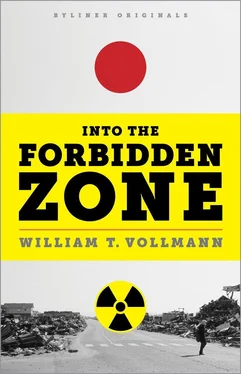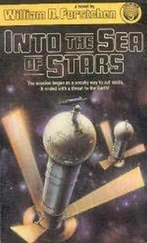“Driver, do you think that nuclear power is wise or unwise?”
“There are three nuclear plants in this prefecture. They are on higher ground than Tepco’s, so I think that is good.”
“So you approve of nuclear power?”
“Well, due to the greenhouse effect, oil and coal are not clean, so as long as they secure the safety, I think that nuclear power is good.”
An old woman in baggy clothes and a flapping shawl staggered down the road. Here came a small cemetery, the steles all upright but the mud churned up disgustingly between them. In the port, the trade show palace appeared in good health from the outside. A glittering stack of Toyotas which had awaited export had been crushed. It was strange to see new paint jobs on pancaked cars.
“So what will happen in the other season when the wind blows in from the south?”
“Well, we don’t have it like that so often.”
“It might only take one time,” I said.
“I agree!” he said with a laugh.
DUE TO HORDES of soldiers and volunteers in Sendai (the Metropolitan Hotel had been entirely turned over to relief workers), I found accommodations at a hot spring more than an hour’s bus ride out of town. Here various hard-pressed employees of the Osaka Gas Company were staying, and in the morning one sometimes saw a truckload of Self-Defense Forces outside. It was a half-empty, second-rate place where the sashimi came wrapped in plastic, although one could only admire the fervency of their many rules (“We firmly refuse your request to enter the baths when you are drunk or if you have tattoos on your body”). 16The waitress proudly assured me that the food was local insofar as possible, so while I was eating it I grew angry again at Bob the salesman, who had promised me a local measurement probe that had never arrived, and of course at Tepco; for how could I have any idea how carcinogenic the fish might be, not to mention these slightly less than fresh greens accompanying them, or the crab claw in the soup? I was not unmindful of the fact that I could eat while so many others went hungry; nor was I so concerned on my own account, for a man in his fifties has already won a victory of sorts; but what about the pregnant women, the young children, the people who should have had decades to look forward to? In the words of yesterday’s paper: “Govt. holding radiation data back: IAEA gets information, but public doesn’t.”
In the body of the article, an unnamed Meteorological Agency official explained that the Japanese government made its own forecasts — never mind that they had been released only once, because, an official named Seiji Shioya explained, “we can’t do it since accuracy is low.” The unnamed official then remarked: “If the government releases two different sets of data, it might cause disorder in the society.” 17Was that why the official statistics offered varying units of measurement, so that in Koriyama the drinking water at the bus station was proclaimed safe on account of its radioactivity being less than a hundred becquerels, while the newspaper reported the radioactivity of this or that city in millisieverts per hour? Nobody I met knew what these numbers meant. How convenient! And so I chopsticked another previously frozen tidbit of horse mackerel into my mouth, wondering how safe it was.
IN CASE YOU HAVE NOT NOTICED, I considered this matter of the reactor to be the real story. Sad as the earthquake and the tsunami had been, the damage had been done, the people killed and property ruined; and now recovery could continue until the next quake. But this other horror wrapped up in becquerels, sieverts, and millirems, it was just beginning, and nobody knew how bad it might be.
(I had asked Peter Bradford: “Could it happen here in the States? I understand we have some reactors of the Japanese type.”
“I don’t think the likelihood is driven so much by reactors of that kind as by the fact that we’re just about as vulnerable as the Japanese to complacency about what used to be called a Class Nine accident. I don’t think we’re any less vulnerable than the Japanese.”)
About the earthquake-tsunami and the concomitant reactor disaster it may be apposite to cite the words of Buddha: “Nothing in the world is permanent or lasting; everything is changing and momentary and unpredictable. But people are ignorant and selfish, and concerned only with the desires and sufferings of the present moment. They do not listen to the good teachings; nor do they try to understand them; and simply give themselves up to the present interest, to wealth and lust” 18—to, for instance, the tax credits awarded those who dwell near a nuclear reactor, not to mention what the reactor enables and impels.
From Buddha’s point of view, it scarcely matters whether all our ease in life derives from uranium pellets, solar cells, or perpetual motion; in any case, our complacency alone protects the lovely roofs and trees of this present instant from becoming the rubble into which the very next moment might in fact cast them. But how many of us (excepting monks) can live and hope — in other words, chase our present interests — without disregarding our inevitable ends? I say we are “better off” pretending that the bullet train we're riding won’t derail. The peril is remote; probably we will die from something else. When the peril is nearer, present interest advises against disregard. The more present the interest, the less present or apparently present the danger, the more irresistible the disregard.
Hence the following parable, courtesy of the paterfamilias of the family who would soon host me on Oshima Island. Refilling my sake glass as we sat in his dark and chilly mud-stained dining room, he remarked that following an infamous tsunami back in the Meiji era, 19many oceanfront plots here and elsewhere were banned from resettlement, but “somehow,” he jocularly continued, people forgot or set the edict aside. Of course, even had they complied, this latest terror would have carried off ever so many, since it rolled in higher than any wave seen by the people of the Meiji period. Who can blame the inhabitants of Oshima for not predicting that?
However, the corporate engineers and presidents, the prefectural governors, the authorities whose task it ought to be to maximize public safety, these super-actors on the civic stage, they must be held accountable should they abandon themselves to their own present interests. The reason that I unalterably oppose nuclear power is so obvious to me that I remain astounded that everybody on earth is not likewise against it: Dangerously radioactive nuclear wastes must be stored and guarded for periods insanely in excess of any civilization’s frame of reference. Were it possible to render those spent fuel rods harmless in, say, five years, even then I’d worry about carelessness and greed, but at least I would be willing to suppose that nuclear power might be useful. Having reached that point, I would, of course, remain among the complacent ignoramuses against whom Buddha’s warning was directed.
Tepco’s complaint-apology — how could we have been expected to foresee so high a tsunami? — is nearly legitimate, but may fall short. “The cooling facilities survived the earthquake, at least partially,” remarked my interpreter. “The disaster occurred because the cooling facility was totally destroyed by the tsunami. The cooling facility was located lower than the reactor itself. Their assumption was a five-point-seven-meters tsunami while the tsunami was actually fourteen.” Well, should Tepco have been expected to prepare for a fourteen-meter tsunami?
Whatever your answer may be, please consider Buddha’s admonition an instant longer. “They do not listen to the good teachings; nor do they try to understand them; and simply give themselves up to the present interest, to wealth and lust.” If the present interest requires us to consume more and ever more energy, then dangerous forms of energy generation may become accepted as necessary. Practically speaking, any individual Japanese (or American) is powerless to prevent the construction of nuclear plants. But while you read this story, please consider how many more times you desire the Fukushima reactor disaster to occur. Should you come down on my side, consider relocating upwind.
Читать дальше












